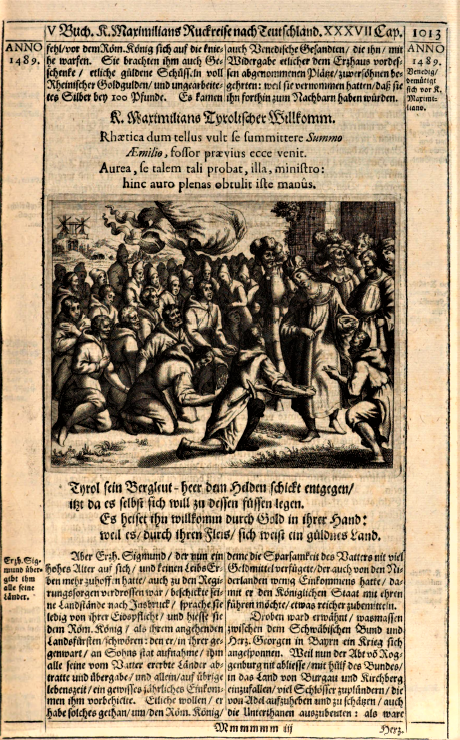The Innsbruck Landtag of 1490
In the first week of March 1490, Maximilian I, King of the Romans, arrived in Innsbruck for the political congress that would decide the future of the Upper Austrian lands that belonged to his cousin, the ageing Archduke Sigmund.[1] Sigmund’s reign over his territories in the Tyrol and Vorlande had been of great concern to the King, Emperor Friedrich III and the local Estates. The Archduke was an irresponsible and frivolous ruler who had been wasteful of the income he received from the region and now threatened to sell most of his lands to the Duke of Bavaria – an unpopular plan opposed by Maximilian and Friedrich, who wished to keep the territories in Habsburg hands. At the start of March 1490, Maximilian travelled to Innsbruck to resolve this matter once and for all, arriving in the town with an impressive entourage that included many princes of the Empire.[2]
In 1668, the Nuremberg poet Sigmund von Birken published a historical work on the Habsburg rulers, Spiegel der Ehren des höchstlöblichen Kayser- und Königlichen Erzhauses Oesterreich (Nuremberg, Endter: 1668), which reports on Maximilian’s Innsbruck visit (» Abb. Maximilian I is received by Archduke Sigmund at the Innsbruck Landtag). If we are to believe Birken’s account, Archduke Sigmund “received [Maximilian] magnificently, and amongst other diversions, led him to see the treasures of the Tyrol”.[3] The “treasures” were the silver mines that promised the province and its Archduke great prosperity and counted amongst the Habsburgs’ most valuable possessions at that time. [4] Their importance to the region and to the Archduke is represented by Birken in an image that depicts Maximilian’s visit (»Abb. Maximilian I is received by Archduke Sigmund). Here, the King is shown greeted by the miners of the region, described by Birken as “7400 in number, [who] came towards [Maximilian and Sigmund], under a billowing flag, in good order, and upon the Archduke’s command, fell to their knees before the Roman King.”[5] A number of gifts were then presented to Maximilian – “several golden dishes full of Rhenish guilders and 100 pounds of unworked silver” – as were Venetian envoys, who wished to reconcile themselves with the king who was likely to inherit Sigmund’s lands.[6] The significance of this meeting is further celebrated by Birken in two epigrams entitled “King Maximilian’s Welcome to the Tyrol”, the first in Latin, the second in German. While similar in their message, the two epigrams differ in some respects. In the first one, the Tyrol is given its Latin name “R(h)aetia” while Maximilian is named “Greatest Æmilius”:
The German epigram again refers to the wealth of the Tyrol and the work of its miners, this time identifying Maximilian as “the hero”:
From Sigmund von Birken’s Spiegel der Ehren des höchstlöblichen Kayser- und Königlichen Erzhauses Oesterreich (Nuremberg, Endter: 1668), p. 1013 (http://mdz-nbn-resolving.de/urn:nbn:de:bvb:12-bsb10864524-4).
This retrospective account presents Maximilian already as the hero of the Tyrol as chosen by Archduke Sigmund. Following the two epigrams, Birken recounts that Sigmund had convened the Landtag from 8 March to have his Estates swear their allegiance to Maximilian as the new Archduke.[9] Yet, the proceedings of the Landtag were not so clear-cut. Only after the Tyrolean Estates had expressed their grievances against Sigmund’s poor government of his court and lands, did Maximilian manage to privately persuade the Archduke to abdicate, promising him a large subsidy as well unrestricted hunting and fishing rights in the Tyrol. As a result of this agreement, which was formally communicated to the Tyrolian assembly on 16 March 1490, Sigmund relinquished his rule over the Tyrol and the Vorlande to Maximilian.[10]
